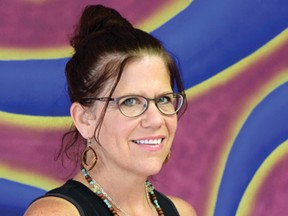Happy Healthy YOU

Article content
Kelly Spencer - Happy Healthy YOU
(A wellness column by Kelly Spencer: writer, life coach, yoga & meditation teacher, holistic healer and a mindful life enthusiast!)
Recently my son and I took a snowy drive to London for football registration. As we were leaving London, we were held up in traffic at one of the busiest intersections in the city (the corner of Wellington and Commissioners). Wet snow was coming down and we witnessed a younger man standing on the thin intersection median with a sign... "Homeless. Hungry." He walked back and forth while the cold precipitation landed on him.
My 17-year-old boy said, "That's really sad. I want to give him money or something.” We were on the outside lane of three but I suggested that it was a red light and if he wanted to, to give. He got out of the car, walked in between the vehicles stopped and made his way over several lanes of traffic and handed this man $20 of his own money. The homeless man was so grateful, the smile lit up the intersection. As this young man walked away, he looked back several times. Then as the light turned green and the traffic started to advance, he repeatedly looked over his shoulder until we passed him in our car. His eyes beamed as he smiled and mouthed “thank you.”
Through the years I have heard the reasons why we shouldn’t give to homeless people: Statements such as “they will use it for drugs or alcohol,” or “they should get a job” and queries of “how does someone let themselves go so low?” But maybe we should shift the focus to why we should give rather than why we shouldn’t?
Actor Richard Gere recently spoke about his upcoming role in his new movie Time Out of Mind where he plays a New York City homeless person. Gere stated, “It was really freaky. No one paid any attention. No one made eye contact. It was worse than being invisible. It’s like a black hole that people are afraid to get sucked into.” He added, “There’s something about being invisible or radioactive – however you want to define how that person’s perceived in society – it leads to a kind of madness. I think how quickly that can happen to people is shocking. It would happen to all of us in that situation.”
So how can we help people that need assistance? I can tell you how we don’t… judgment, ignorance, blame, minimizing, ignoring and hate/displeasure of them.
Here is what I do know. That moment when my son felt compassion and connection to another human being that is not as privileged as him, three things happened. One: the young man that stood cold and hungry and begging the world to help him for whatever his reasons, felt hope and gratitude in his world. After walking back and forth in the freezing temperatures pleading to the cars that drove by him in their safety and warmth, he now felt seen and heard. The second thing that happened was my son felt better than he did just watching from afar. He felt kind, loving and compassionate for another person that he had no connection to and most likely would never see again.
Studies reveals that doing good deeds or kind acts significantly increase people's positive moods, optimistic outlooks and increases relationship satisfaction. Research by Alan Luks in his 1991 book, The Healing Power of Doing Good, found that “helpers” reported a distinct physical sensation when being kind. Many reported feeling more energetic, warm, calmer and greater self-worth, a phenomenon he calls the “helper’s high” linking kindness and a gene that releases dopamine known as the feel-good neurotransmitter in the brain.
Also when you do something kind for someone else, the emotional warmth of the experience aids to release the hormone Oxytocin. The result is less stress, balanced nervous system, a healthier immune system and stronger cardiovascular system.
In fact, researcher Stephen Post, author of Why Good Things Happen to Good People, indicates that our physical health is significantly improved when we are kind. “A strong correlation exists between the well being, happiness and health of people who are kind,” says Post. “It’s difficult to be angry, resentful, or fearful when one is showing unselfish love towards another person.”
The third experience that happened was in the energetic field surrounding the moment when my son reached his hand out and the man in need reached his hand out to receive. All the people that witnessed this experience saw an act of kindness and compassion.
Psychology Today states “witnessing altruistic acts can be a source of what Abraham Maslow called ‘peak experiences’ - those moments of awe, wonder and a sense of ‘rightness’ which make us feel immensely grateful to be alive!” It is, in his words, “a manifestation of humanity’s ‘higher’ or ‘better’ nature.”
So GIVE freely and wildly. It will help them, you and all that witness the experience.
(If you would like to see an article on a specific topic, please email kelly@indigolounge.ca)